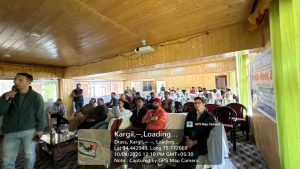Human-animal conflicts addressed at National Wildlife Week 2025 event held at Drass

Kargil, October 04, 2025: On the third day of the National Wildlife Week 2025 celebrations, the Wildlife Protection Division, Kargil, organized a series of educational and interactive programmes at Government Middle School, Bhimbet, and Government Degree College, Drass.
At Bhimbet, the wildlife staff sensitized students on issues related to human–animal conflict and facilitated a field visit for brown bear sighting, providing them with firsthand exposure to wildlife conservation practices.
At Degree College, Drass, the programme witnessed the presence of faculty members, representatives of the Wildlife Department, and speakers, Mr. Veer Bhatnagar and Mr. Niyazul Hassan. The speakers delivered an insightful presentation on strategies for mitigating human–animal conflict, with a special focus on peaceful coexistence and the adoption of measures such as composting techniques to reduce conflict, particularly with respect to brown bear management.
The session also featured practical demonstrations by Wildlife Department officials on camera trapping and wildlife sighting techniques, providing students with valuable hands-on learning experiences.
Addressing the gathering, Principal Nasir Shabani and Dr. Javed Iqbal Naqi emphasized the urgent need to foster harmony between humans and wildlife in order to safeguard the fragile biodiversity of Ladakh.
As part of the awareness campaign, the Department highlighted the Standard Operating Procedure (SOP) for mitigating human–brown bear conflicts, SOP during conflicts & composting techniques. The participants were briefed about the do’s and don’ts to mitigate conflicts which included:
DOs – Maintain clean surroundings, adopt covered composting, dispose of waste securely, fence livestock, use iron doors and windows, report bear sightings, and promote awareness.
DON’Ts – Do not leave food waste in the open, avoid careless composting of meat//dairy, and never store food in open areas.
The resource persons also spoke about procedures to be followed during wildlife attacks and good practices for waste managment and composting techniques.
The programme concluded on a successful note, with enthusiastic participation from students and faculty, thereby spreading awareness on the importance of conservation, coexistence, and responsible waste management to ensure the safety of both communities and wildlife.


